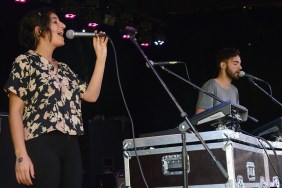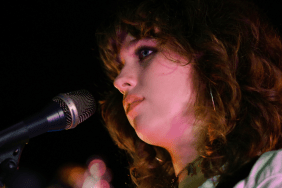Carus Thompson is certainly a troubadour. A man who bounces between Australia and Europe playing his country tinged tunes to anyone who would listen. And those who do, usually walk away a new fan. His brand new album Caravan is a true road album by definition. Taking inspiration from real life and from his worldly experiences, Caravan is possibly Carus’ best work to date. Currently back home on tour, Carus took time out to talk to me about the new record, married life, writing songs and the need for him to keep travelling and performing.
Music Feeds: Firstly, I hear congratulations are in order on recently getting married! Does it play an important part in your music now that you’re married?
Carus Thompson: We’ve been together for a long time so marriage was more an idea to make things easier with moving to and living in Europe initially, but once we did, it’s a very nice thing! I don’t think it has anything to do with my music, being married itself, but for any artist having a partner who supports what you do and how many sacrifices you need to make to do it – this is just essential, otherwise you can’t do it. The path of an independent singer-songwriter is not an easy one and you need lots of support to keep it all going. I’m really lucky that my wife believes in what I do and is proud of what I do. She’s also a great writer herself and she gave me a lot of help lyrically with the album.
MF: The new album is Caravan, tell us a bit about it?
CT: I’ve written & recorded Caravan over the past year that I’ve spent on the road in Europe. It’s not a ‘road’ album in the sense that it’s all about smokey bars and hotel rooms but rather in it was made completely on the road. I wanted the album to really show what my life has been like over these past two years of touring my arse off. I wanted the album to be as close to who I am as I could make it. So I involved all of the people who have made up the ‘Carus’ story so far – my friend Seth Lakeman from the UK, Greg Arnold as producer, Brad Jones from Nashville as mixer, my brother Christian Thompson on harmonies and both my European and Australian bands. By making the album in studios between England, Germany and Australia as well as capturing this travelling, touring headspace I’ve been in I could also get all these people on the album. This is the closest I’ve come to really making an album that reflects what I do with all its variations.
MF: Talk us through the songwriting process for this one?
CT: I am the most proud of these songs on Caravan out of any that I’ve penned before. Not just because they are just better songs straight up, but also because I started from scratch with this album. I didn’t have any songs hanging around – at the beginning of the writing process I had nothing…which in the end made it turn out great – as all the songs are helped by the greater experience that I’ve now had as a songwriter after five six and four EPs. In terms of the process this is now my third album with Greg Arnold producing and he has taught me the huge value in re-writing. I was constantly looking back and lyrics, melodies and arrangements… are these as good as they can be… what am I saying with these two lines. For Caravan I think I must have written over thirty songs easily, however I was constantly culling the songs down and throwing out ones that weren’t good enough. The fact that I was writing on the road gave me a lot of time to sit in a car, on a plane or train and just think…. Think about the songs, think about stories people have told me, think about my own life and the choices I’ve made and the people I’ve known. The travelling headspace of nostalgia and introspection is a great place to be as a songwriter and again this is why I called the album Caravan as this headspace is there in all the songs I feel. Think of when you take a long train trip and look at the window – thinking about stuff, could be something from last week or something from when you were 8 years old – an old friend who fell off the rails, or a chance you didn’t take and regret….. These are the things I used in the songs on Caravan.
MF: How does a song start for you. Is it a melody, a chord structure or is it a lyric or idea?
CT: I’ll have a bunch of ideas for lyrics in my head… but there will always be some kind of story that’s inherent to it. In essence my songs are folk songs in that they are stories. They may be a very simple personal story of love or they may be a more complex narrative telling of someone else’s story, like the song Bright Star on the album which tells the tale of Peter Norman – a runner for Australia in the 1968 Olympics in Mexico who took part in the famous ‘Black Power’ demonstration for human rights.
Then I’ll come up with some sort of guitar thing, a chordal structure – essentially a mood.. these ideas may give me another idea for a song or I might use some of these ideas that I’ve already got floating around in my head.
But I am not a guy who writes lyrics first and then puts music to it; the two definitely influence each other.
MF: As you get older are you more conscious of what you’re trying to say in songs more than when you did as a teenager?
CT: I am more interested in telling stories and creating these little worlds in my songs. Creating characters, incidents and places where the listener can really see it. I’m trying to paint better and better pictures for the listener – much in the way Paul Kelly or Mick Thomas do. I still like to write from my own life and to be as honest as I can as I think this is part of what I do, but I am becoming more and more adept at a narrative or story-telling song. I think I am getting much better and being more direct and making the listener believe me. People have to believe the characters that you take when you’re singing a song … it doesn’t matter if it’s a true story from your own life, a story from someone else’s life or a story you made up. In fact if you are doing it correctly they shouldn’t be able to tell as when you sing a song you should disappear into the performance of the characters within it. When people believe a song that’s when it works.
MF: You started writing at 12; what was the first song called and what was it about?
CT: It was terrible…about dolphins dying and oil falling into the sea. I was only 12 though! I still play a song that I wrote when I was nineteen – Thrown though, in fact it’s been one of my most popular songs. The thing about getting older is you experience more in life, you visit more places, you meet more people. The more ‘real life’ signposts you can put in a song the more it will ring true for the listener. That’s why getting older doesn’t scare me as an artist – I think songwriters definitely get better with age as they’ve been through more in life.
MF: How’s it feel to be back home touring for the first time in over 3 years?
CT: Fantastic! Europe is amazing for me and I’ve had such success over there, however I am from the Australian music scene and ultimately I always want to prove myself here and show that I can hold my own as part of the incredibly strong scene with all the amazing bands and artists we have.
MF: Is it difficult having two live bands, one here and one in Europe? Do you find there’s some subtle sonic differences?
CT: There are some subtle differences for sure. However I think the amazing thing about Caravan is that I don’t think you can tell which band is which. This is because the focus is always the song and how best to serve the song. My music has never been about big long jazz solos or something … it’s about communicating the song and the story to the listeners …. as the songs stay constant and remain the focus I don’t think there’s much difference between the bands. Just that my Australian band drink beer and my French band prefer wine, cheese and Havana Club Rum…
MF: What can fans expect from the shows on this tour?
CT: I’m touring with my full band for the first time in three years so they can expect a show of full dynamics. I love to have variety in my show and I pride myself on being able to go from big rocking out country rock numbers to groovy reggae dance tunes then down to intimate acoustic ballads. They’ll be entertained and engaged, and they’ll hopefully really enjoy the songs!
MF: You’ve lived a slightly nomadic lifestyle living all over Australia and Europe; does being a full-time musician contribute to that lifestyle or is it more a result of that lifestyle?
CT: It’s definitely a choice that I made in my life. I wanted to be a songwriter and I wanted to get my songs out there. Part of writing songs, I believe, is performing them to people. It’s pretty hard to get on the radio these days, so in absence of that and major label support I’ve just headed out on the road and taken my songs to people the old fashioned way … in pubs, clubs, cafes, street corners – however you need to do it. That’s where all the travel first came from, but I would definitely say that as I’ve gone further down this road you do really welcome it and look forward to seeing new places, meeting new people. It’s great to be able to get out there and involve yourself in the world and its every day stories that are unfolding everywhere.
MF: What would be the first song you’d put onto a mix tape?
CT: Over Yonder – Steve Earle. Pretty damn sad – but beautiful!!!












